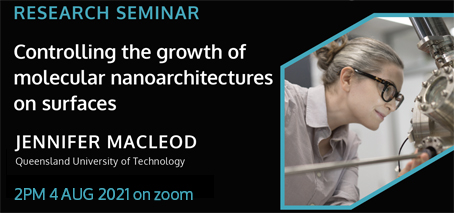-
4 Aug 2021
2:00 pm - 3:00 pm
Associate Professor, Jennifer MacLeod, School of Chemistry and Physics, Queensland University of Technology
Register in advance for this meeting
After registering, you will receive a confirmation email containing information about joining the meeting. All welcome – please share the seminar flyer with your network.
Abstract
Bottom-up approaches hold the promise of targeted design of nanomaterials. Using suitably-chosen organic molecular building blocks, our aim is to define the structure and function of the product materials. Constructing these materials on a surface provides control of the structure: the surface enforces planarity, behaves as an epitaxial template, and can also modify the deposited molecules by acting as a catalyst or by donating adatoms. The variety of available molecular building blocks and surfaces provides access to a near-infinite range of 2D structures.
Here, I will discuss our recent work in using small molecule precursors to synthesize nanomaterials through on-surface reactions. Using surface-catalyzed dehalogenative and decarboxylative reactions, we have investigated the on-surface coupling of a range of small aromatic molecules on transition metal surfaces. Although the organometallic products of these reactions are often beautifully ordered, the covalent products can be quite disordered and unpredictable. We have used a range of techniques (photoemission spectroscopy, near-edge x-ray absorption fine structure spectroscopy, scanning tunneling microscopy, density functional theory) to performed detailed investigations of the reaction process, providing insight into some of the factors that lead to poor control over covalent products. We have also looked into the role of the halogen byproducts in the dehalogenative approach, and have found a relatively simple way to remove them from the surface.
Using a home-built low-energy inverse photoelectron spectroscopy (LE-IPES) in combination with ultraviolet photoemission spectroscopy, we have been able to examine how the electronic properties (HOMO-LUMO gap) evolve during these on-surface reactions, providing insight into structure/function relationships in one- and two-dimensional organic materials.
About the speaker
Jennifer MacLeod is an Associate Professor and Head of School of Chemistry and Physics at Queensland University of Technology (QUT). She has a PhD in Physics from Queen’s University (Canada), and has worked in Canada (INRS-EMT, Quebec), Italy (University of Trieste) and Australia (QUT) as a surface science researcher. Her interests are in molecular reactions on surfaces, 2D materials, and spectroscopy and microscopy techniques to elucidate these systems.
This seminar is co-presented by FLEET and the Monash School of Physics and Astronomy.
Time converter at worldtimebuddy.com

